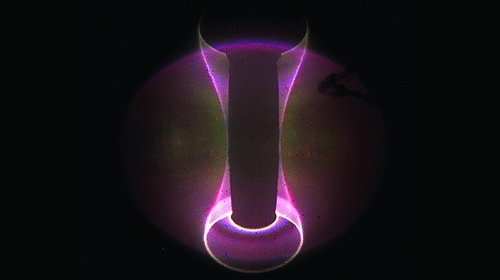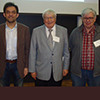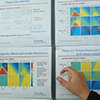
Bylaws of The Annual Controlled Fusion Theory Conference Executive Committee
Revised April 2018
I. Name
The conference shall be known as "The Annual Controlled Fusion Theory Conference" and is also commonly referred to as the “International Sherwood Fusion Theory Conference.”
II. Objective
The Annual Conference is organized for educational and scientific purposes consistent with the meaning of section 501 (c) (6) of the Internal Revenue Code. Specifically, the objective of the Annual Conference shall be the communication of recent results in the physics of controlled fusion energy.
III. Executive Committee
A thirteen-member Executive Committee shall provide continuity in the organization and administration of the Annual Conference from year to year. Of these, one shall be an ex officio from the Department of Energy (DoE) Office of Fusion Energy Sciences (OFES), and one from each of the four DoE National Laboratories with significant fusion theory programs (LANL, LLNL, ORNL, and PPPL). These four National Laboratories shall choose their Executive Committee members internally for a three-year term, which can be renewed once. The DoE OFES shall choose an ex officio internally for an indefinite term. The remaining eight members shall be elected, according to the procedure described in Article V. of these Bylaws, from other institutions that have research programs in controlled fusion energy theory or in associated areas of plasma theory to serve for a term of three years. If a member who is concluding their term on the Executive Committee is elected Vice-Chair his or her term on the Executive Committee shall be extended by one year. The Chair shall extend his or her term by one year as Past Chair. In the event a member who has already served a term on the Executive Committee is elected Secretary/Treasurer his or her term shall be extended by two years. No more than one member of the Executive Committee shall be from any one laboratory, university, or industrial facility.
The Executive Committee shall have a Chair, a Vice-Chair, and a Secretary/Treasurer. There shall be the following standing committees: Program Subcommittee (six members), Nominations Subcommittee (three members), Audit Subcommittee (two members), and Local Arrangements Subcommittee (seven members, of whom four, including the subcommittee chair, shall be from the host institution, two shall be members of the Executive Committee, while the Sherwood Administrator shall serve as ex officio).
IV. Executive Committee Meetings
The Executive Committee shall have at least two meetings each year, one during the annual meeting of the APS Division of Plasma Physics (in the fall) and another during the Annual Controlled Fusion Theory Conference (in the spring).
During the fall Executive Committee meeting, the Vice-Chair shall assume the Chair's duties and a new Vice-Chair shall be elected, from among the members, by majority vote, following nominations from the floor. The Executive Committee Chair shall appoint the chairs of the standing subcommittees and in consultation with the newly appointed subcommittee chairs, appoint subcommittee members. Nonmembers of the Executive Committee may be appointed to subcommittees, but without voting rights in the Executive Committee.
All members voting at Executive Committee meetings must be Executive Committee members.
Whenever it is deemed to be feasible, necessary because of time urgency, and not to the disadvantage of any member of the Executive Committee, the Chair may initiate e-mail deliberations and voting on Executive Committee matters in between the spring and fall meetings. The deadline for deliberations and voting shall be communicated clearly to all Executive Committee members. Discussions on such matters shall be addressed to all members of the Executive Committee. The Secretary/Treasurer and the Sherwood Administrator shall tabulate the voting. The e-mails shall constitute a record of discussion, and shall be summarized in the Minutes of the subsequent Executive Committee Meeting.
Additionally, for the same reasons of urgency and with the same restrictions, the Chair may call for a meeting by telephone conference call in between the spring and fall meetings. The Secretary/Treasurer and the Sherwood Administrator shall keep the minutes of this meeting and tabulate any voting. The minutes will be read at the subsequent Executive Committee Meeting.
V. Election to Executive Committee
During the Executive Committee meeting in the spring, the Nominating Subcommittee shall present a slate of candidates for membership from institutions other than LANL, LLNL, ORNL, or PPPL that have research programs in controlled fusion energy theory or in associated areas of plasma theory. Suggestions for this slate shall be solicited from attendees of the Annual Conference and from the members of the Executive Committee. The number of candidates shall be twice the number of openings for the available seats. The number of openings shall be such that following the election the total number of members elected by the Executive Committee shall be eight. From this slate, the requisite number of new members shall be selected by closed ballot with run-off elections held in the event of ties. Their term shall begin at the beginning of the following fall meeting of the Executive Committee. In the event of the resignation of an Executive Committee elected member the Chair shall make an interim appointment valid until the next election, at which time this position will be open for election.
VI. Duties of Officers
The Chair shall be responsible for calling and chairing meetings of the Executive Committee, shall make all interim appointments to the Committee, shall appoint members of subcommittees, and shall notify the Committee members at least one month in advance of a Committee meeting.
The Vice-Chair, in the absence of the Chair, shall assume the duties of the Chair. At the request of two-thirds of the membership of the Executive Committee, the Vice-Chair may call a meeting to vote on early dismissal of a Chair. A vote of two-thirds of the entire Executive Committee is required for early dismissal of any officer. The dismissed individual remains a member of the Executive Committee.
The Secretary/Treasurer shall record and distribute minutes of Executive Committee meetings within eight weeks after each meeting. He or she shall be responsible for and oversee the financial affairs of the Annual Controlled Fusion Theory Conference and make sure that start-up funds are available to the upcoming host Local Arrangements Subcommittee. At each meeting, he or she will give a financial report. An appointed Audit Subcommittee shall audit the funds semi-annually.
The Secretary/Treasurer shall hold the records of the previous ten years and will pass them onto the next Secretary/Treasurer.
VII. Character of The Annual Conference
The general procedures for the Annual Conference shall be established each year during the fall Executive Committee meeting preceding the Annual Conference. The Annual Conference shall be invitational, in regards both to attendance and presentation of research papers, to maximize the effective communication of information. Abstracts of all the research papers accepted for the Annual Conference shall be made available online. A subset of these papers shall be selected by the Program Committee for invited oral presentation, together with three invited review papers covering topics of interest.
The choice of the Annual Conference site shall be made at the spring Executive Committee meeting two years in advance. The Executive Committee shall have the responsibility of finding at least one institution willing to host the Annual Conference. In the event, more than one institution volunteers, the Executive Committee shall select one, with due regard for geographic equity.
VIII. Program Subcommittee (6 members)
This subcommittee shall have overall responsibility, subject to Executive Committee guidance, for the program of the Annual Conference, including:
(1) Soliciting and selecting invited review papers subject to the skip-two-year rule described immediately below;
(2) Accepting or rejecting contributed papers based on the relevance of the subject matter and selecting invited oral contributed papers from those submitted using the skip-two-year rule. The skip-two-year rule states that a speaker cannot be selected to give an invited oral presentation if he or she gave an invited review or invited oral presentation at either of the previous two Annual Controlled Fusion Theory Conferences. Exceptions to the skip-two-year rule can be made by 5/6 consent of the Program Committee, with the expectation that such consent would be given in only extraordinary circumstances,
(3) Arranging the program, and
(4) Recruiting session chairs.
Members of the Program Subcommittee are not eligible to be presenting authors of invited review and invited oral presentations. The Chair of the Local Arrangements Subcommittee shall be a member of the Program Subcommittee (although not necessarily a member of the Executive Committee) to facilitate close cooperation between these two committees.
IX. Local Arrangements Subcommittee (7 members)
This subcommittee has responsibility for the following aspects of the Annual Conference, also referred to by this committee as the Sherwood Conference:
(1) Selection of the conference location and hotel;
(2) Distributing email invitations to the conference;
(3) Posting the online program;
(4) Physical arrangements (hotel contract, audio-visual equipment, meeting space); and
(5) Food and beverage arrangements.
The Chair of this subcommittee shall be appointed and confirmed by the Executive Committee at the fall meeting 1 1/2 years preceding the Annual Conference. He or she and three additional members of the Local Arrangements Subcommittee shall be from the host institution, the other two members shall be members of the Executive Committee, while the Sherwood Administrator shall serve as ex officio.
X. Adoption
These Bylaws shall be considered adopted when approved by a majority of the Executive Committee members.
XI. Amendments
Amendments may be posed by any member of the Executive Committee, or by an ad hoc committee appointed by the Executive Committee, for consideration at an Executive Committee meeting. The text of a proposed amendment shall be furnished to the Secretary/Treasurer in time to send copies to all members of the Executive Committee two weeks prior to the Executive Committee meeting at which the amendment is to be discussed. The amendment shall be adopted and become effective immediately if approved by a majority vote of the Executive Committee.
XII. Dedication of Assets Upon Dissolution
Upon dissolution of the Annual Conference and its Executive Committee, the assets remaining after payment of liabilities will be distributed for one or more exempt purposes consistent with the meaning of section 501 (c) (6) of the Internal Revenue Code, or corresponding section of any future federal tax code.
Appendix: History of the Conference
The Annual Conference originated in 1974, with the following persons agreeing to serve on the Executive Committee during the period from November 1, 1974, to the Fall 1977 annual conference:
D. Baldwin, Lawrence Livermore Laboratory
R. Davidson, University of Maryland
D. Dobrott, General Atomic
H. Lewis, Los Alamos Scientific Laboratory
B. Fried, University of California at Los Angeles
E. Frieman, Princeton Plasma Physics Laboratory
H. Grad, New York University
G. Guest, Oak Ridge National Laboratory
N. Krall, Science Applications, Inc.
B. Miller, ERDA (Department of Energy)
M. Rosenbluth, Institute for Advance Study
D. Ross, University of Texas
R. Sudan, Cornell University/NRL
Of the initial eight members from academic and industrial institutions, four were to leave office at the fall 1977, Executive Committee meeting and four at the fall 1978, Executive Committee meeting, with replacements to be elected, starting with the spring 1977, Executive Committee meeting, according to the procedures of Article V. of the original Bylaws. Of the five initial DOE members, three were to be replaced internally at the fall 1977, Executive Committee meeting and two at the fall 1978, Executive Committee meeting. The choice of resignation dates for the initial members were to be on a voluntary basis, or, if that did not suffice, to be determined by drawing lots or such other procedure as the Executive Committee would adopt at its spring 1976, Executive Committee meeting.
During 1975, Marshall Rosenbluth (Institute for Advanced Study), Ed Frieman (Princeton Plasma Physics Laboratory), and David Ross (University of Texas) agreed to serve as Chair, Vice-Chair, and Secretary/Treasurer, respectively. New officers were to be elected, following the procedures in Article IV. of these Bylaws, at the fall 1975, Executive Committee meeting.
These Bylaws were originally adopted by a majority of the Executive Committee members.




